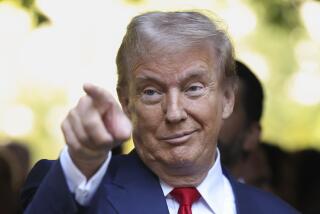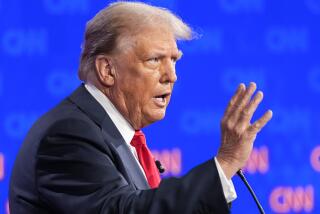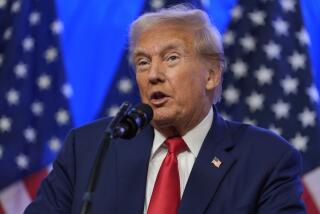Editorial: President Trump would have significant conflicts of interest with Trump the businessman
Donald J. Trump is a rich man. Exactly how rich is unknown. Around $10 billion, as he has claimed? Or $4.5 billion, as Forbes counted? Maybe just a few hundred million? Voters likely won’t know unless Trump releases his tax returns, a modern tradition for presidential candidates that Trump says he can’t follow because he’s being audited — even though experts, including the IRS, say an audit has no legal bearing on whether Trump can share his returns with the electorate.
The point of releasing his returns isn’t merely to satisfy idle curiosity about the size of his income. It’s to reveal whether he pays a reasonable amount of tax and the scope of his charitable giving — and, importantly, to give a sense of where his financial interests and conflicts might lie if he does, indeed, become president.
Right now that issue is murky. What is known is that whatever Trump has amassed has come primarily under the umbrella of the Trump Organization, which, as Newsweek recently reported, has interests around the globe. In addition to building hotels, golf courses and resorts in other countries, the company has numerous licensing agreements under which developers pay to use Trump’s name on hotels, office towers, and the like.
It’s not unreasonable to wonder whether Trump, who brags about the art of the deal, would make his presidential decisions with his business holdings in mind.
Those foreign holdings could create conflicts between Trump’s personal financial interests and U.S. national interests, giving foreign leaders ways to use Trump’s holdings as leverage to influence federal policy. Consider, for example, how tempted a foreign government might be to turn the screws on a Trump resort within its borders — tearing up an entrance road, denying permits, causing power outages — in the hope of obtaining concessions in a negotiation or forestall a complaint about unfair trade practices. Conversely, it’s not unreasonable to wonder whether Trump, who brags about the art of the deal, would make his presidential decisions with his business holdings in mind.
Consider what’s happening in Turkey, where Trump’s ugly anti-Muslim rhetoric has earned him the enmity of President Recep Tayyip Erdogan, who had taken part in a ribbon-cutting of Trump Towers Istanbul in 2012. In the wake of Trump’s comments on the campaign trail, Erdogan said his presence at the opening was a mistake and called for Trump’s name to be stripped from the towers.
Similarly, Trump has holdings and interests in Russia, with which the U.S. has been engaged in an increasingly fraught back-and-forth over Syria, Crimea and other international flash points. ABC reported Thursday that existing U.S.-led sanctions against Russia would create a significant conflict for a President Trump, whose job would be to develop a foreign policy that defends American interests — potentially at the expense of his business partnerships with Russian investors and his development projects in Russia.
The question, of course, is what would President Trump do if his business interests conflicted with the national interest? Given that Trump is pimping his new hotel in Washington and other business ventures at campaign news conferences, there’s reason to be nervous.
Trump has said that if he wins, he would turn the reins of the Trump Organization over to his children, who are already active in the business. But Trump can’t erase his knowledge of what buildings and projects bear his name — and in what countries — and neither can the leaders and bureaucrats of other nations. No law requires a president or a candidate to divest or create a blind trust (putting control of assets under someone else’s discretion), but that has become the standard, and most recent candidates and presidents — Mitt Romney, Ronald Reagan, both George Bushes and Bill Clinton — did so.
Yet the nature of Trump’s business makes a blind trust insufficient. His financial gains and losses aren’t based on decisions over which companies in which to buy stocks. His business is both real property and the brand he built as a television personality, developer, author — all the roles that he has cited as the foundations of his success. He can’t put himself in blind trust, and placing the Trump Organization under the control of the next generation is neither arm’s length, nor adequate.
Trump’s position is untenable, and he needs to show voters that he has a realistic plan for disentangling himself from his empire if he wins in November. If he can’t do that, voters would be right to insist that the Trump family sell the business.
Follow the Opinion section on Twitter @latimesopinion and Facebook
More to Read
A cure for the common opinion
Get thought-provoking perspectives with our weekly newsletter.
You may occasionally receive promotional content from the Los Angeles Times.










